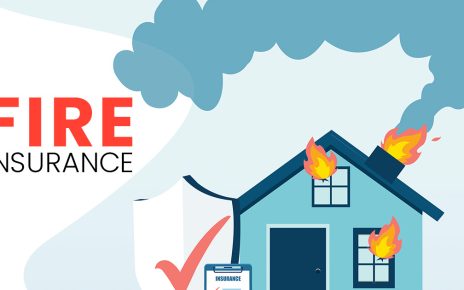Home insurance is a critical safeguard that protects one of your most valuable assets—your home. It provides financial coverage against various risks, such as natural disasters, theft, accidents, and liability. Whether you’re a homeowner or a renter, understanding the importance of home insurance is crucial for protecting your property, belongings, and financial stability.
1. What is Home Insurance?
Home insurance, also known as homeowner’s insurance, is a policy that provides financial protection for your home and personal belongings against damage or loss due to specific events. These events typically include natural disasters (like fire, lightning, storms, and earthquakes), theft, vandalism, and other unexpected incidents.
2. Types of Home Insurance Coverage
Home insurance policies often combine different types of coverage to provide comprehensive protection:
- Dwelling Coverage: Protects the physical structure of your home, including walls, roof, floors, and built-in appliances, against covered risks.
- Personal Property Coverage: Covers the replacement or repair of personal belongings, such as furniture, electronics, clothing, and other valuables, in case of damage or theft.
- Liability Coverage: Provides financial protection if you or a family member is found legally responsible for injury or property damage to others. It also covers legal expenses and medical costs.
- Additional Living Expenses (ALE): Covers the cost of temporary housing, meals, and other expenses if your home becomes uninhabitable due to a covered event.
3. Why Home Insurance is Important
Protects Your Investment
- Financial Security: Your home is likely one of your most significant investments. Home insurance helps protect this investment by covering repair or rebuilding costs in case of damage from unforeseen events.
- Mitigates Financial Loss: Without home insurance, the cost of repairs or rebuilding after a disaster could be financially devastating. Insurance provides a safety net, minimizing the potential for loss.
Covers Personal Belongings
- Replacement Costs: Home insurance policies typically cover personal belongings, such as furniture, electronics, clothing, and other valuables. If your possessions are damaged or stolen, the policy can help cover replacement or repair costs.
- Off-Premises Coverage: Many policies also provide coverage for personal items even when they are outside your home, such as when you’re traveling or staying in a hotel.
Provides Liability Protection
- Accidents Happen: If someone is injured on your property, you could be held legally responsible. Home insurance includes liability coverage to protect you against costly lawsuits and medical expenses, ensuring peace of mind.
- Covers Legal Fees: If a legal claim is filed against you, home insurance can help cover legal defense costs, which can add up quickly.
Required by Mortgage Lenders
- Mortgage Requirement: Most mortgage lenders require homeowners to have home insurance to protect their investment in your property. If you don’t have insurance, the lender may purchase it on your behalf, often at a higher cost.
- Loan Approval: Having home insurance is typically a prerequisite for obtaining a mortgage, making it essential for homebuyers.
4. Factors to Consider When Choosing Home Insurance
Coverage Amounts
- Replacement Cost vs. Actual Cash Value: Replacement cost coverage pays for the full cost of repairing or replacing damaged property, without deducting depreciation. Actual cash value coverage, on the other hand, considers depreciation and may offer lower payouts.
Deductibles
- Understand Your Deductible: A deductible is the amount you must pay out of pocket before your insurance coverage kicks in. Higher deductibles typically mean lower premiums, but it also means you’ll pay more upfront in the event of a claim.
Policy Exclusions
- Know What’s Not Covered: Not all events or types of damage are covered by standard home insurance policies. For example, most policies do not cover damage caused by floods or earthquakes. You may need to purchase separate policies or endorsements for these risks.
Discounts and Bundling
- Look for Discounts: Many insurance providers offer discounts for installing safety features, such as smoke detectors, security systems, or bundling home insurance with other policies like auto insurance.
5. How to Choose the Right Home Insurance Policy
- Assess Your Needs: Evaluate the value of your home, its contents, and any specific risks in your area (like floods or earthquakes). This will help determine the type and amount of coverage you need.
- Compare Quotes: Shop around and compare quotes from different insurance providers to find a policy that fits your needs and budget.
- Review Policy Details: Understand the coverage limits, exclusions, deductibles, and claim processes of each policy. Make sure you know exactly what is covered and what is not.
6. Tips for Maintaining Your Home Insurance
- Keep an Updated Inventory: Maintain a detailed inventory of your possessions, including photographs, receipts, and appraisals. This will help streamline the claims process in case of loss or damage.
- Regularly Review Your Policy: As property values, local regulations, and personal circumstances change, it’s essential to review your home insurance policy regularly to ensure it still meets your needs.
- Make Home Improvements: Upgrading your home’s safety features, such as installing a security system, smoke detectors, or storm shutters, may qualify you for discounts on your insurance premiums.
7. Conclusion
Home insurance is essential for protecting your home, belongings, and financial stability. It offers peace of mind, knowing that you’re covered in case of unexpected events, accidents, or disasters. By understanding the different types of coverage, assessing your specific needs, and choosing the right policy, you can safeguard your most valuable asset and ensure long-term security for yourself and your loved ones.




